El Malecón de Ciudad Bolívar: Río Orinoco, Puente de Angostura y Piedra del Medio [ENG/ESP]
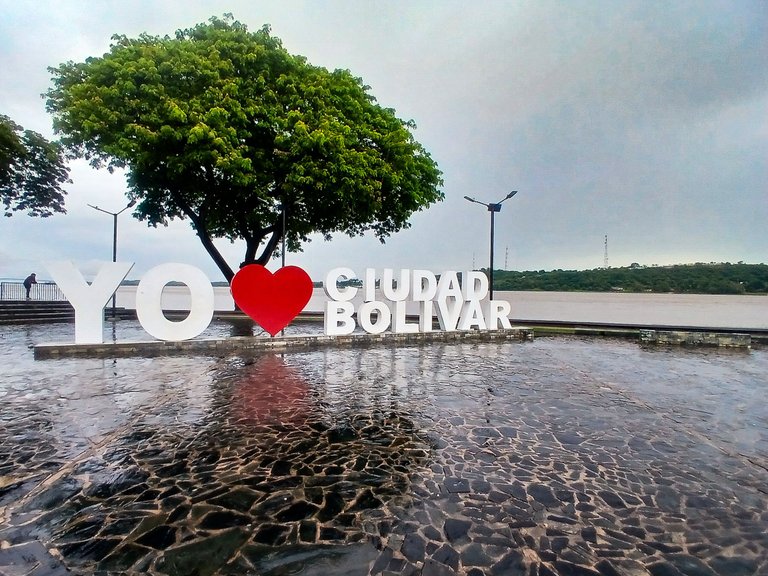
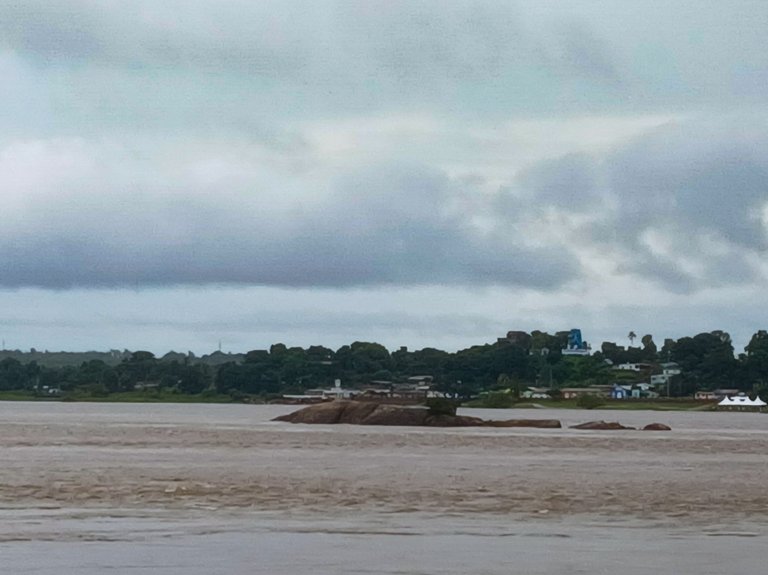
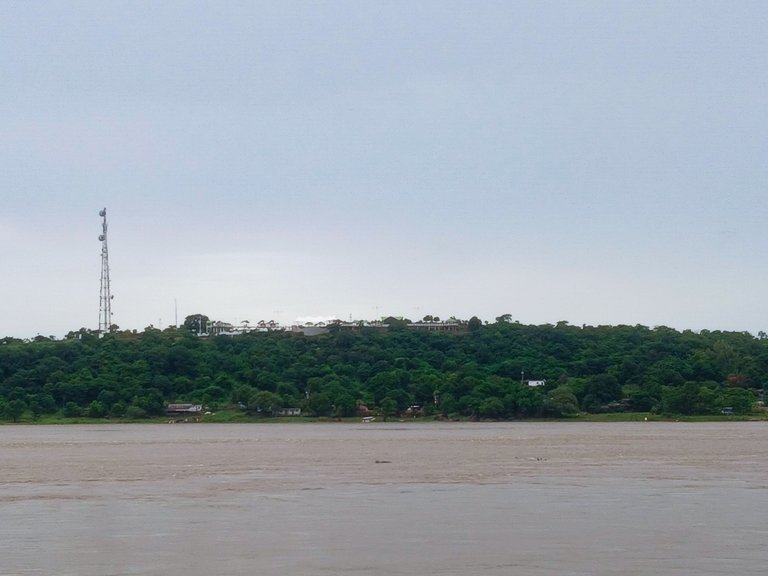
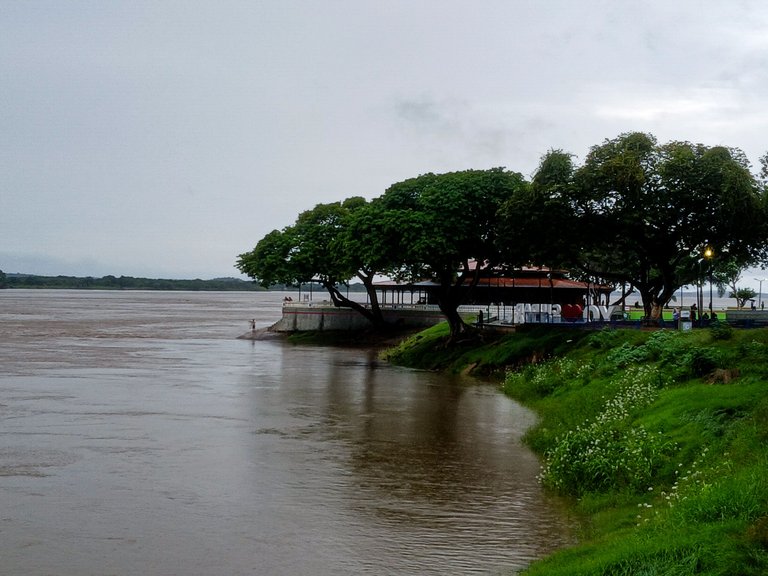
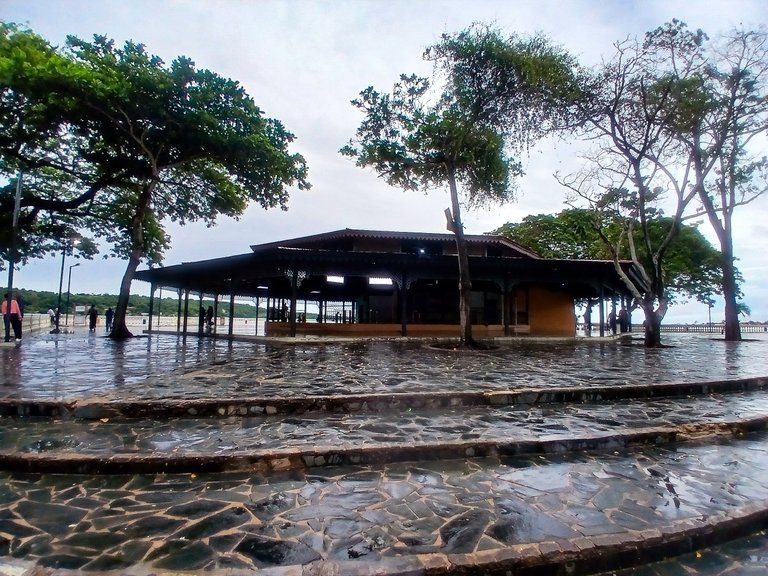
Greetings to everyone in the Worldmappin community! Today I'm joining you here to share a new tourist review. This time, it's about the Malecón (Bolivian Seawall) in Ciudad Bolívar, located in Bolívar state, Venezuela. This is one of the landmarks you'll have by default if you visit the city and want to explore the Orinoco River. Getting there is relatively easy, as there's plenty of public transportation. If you'd like, you could do what we did: walk around the city and simply go down the streets, following the guidepost on the horizon where the river can be seen until you reach the shore.
It's unusual to find Ciudad Bolívar experiencing a rainy, temperate climate. It's usually one of the hottest cities I've visited, with a blazing, unstoppable sun, so experiencing this climate was different. The rains led to another important phenomenon in the city: the Orinoco River rose and its banks had risen. In the images, you can see "The Middle Stone," a rock formation named the Orinocometer by Alexander Humboldt, given that when the river rose or fell, the water level could be indicated by the large rock. This is still done to this day; in fact, several people pointed this out to us. It is also said that there was once a tree known as "Piedra del Arbolito," which was cut down out of nowhere.
¡Saludos a todos en la comunidad de Worldmappin! El día de hoy me uno por aquí para compartir con ustedes una nueva reseña turística. En esta ocasión se trata del Malecón de Ciudad Bolívar, ubicado en el estado Bolívar, Venezuela. Este es uno de los puntos de referencia que tendrás por defecto si llegas a visitar la ciudad y deseas conocer el río Orinoco, siendo relativamente fácil llegar hasta allí pues hay bastante transporte público y si lo deseas, podrías hacer como lo hicimos nosotros; caminando alrededor de la ciudad y simplemente bajando a través de las calles siguiendo la guía que se ve al horizonte dónde se ve el río hasta llegar a la orilla.
Es inusual encontrar que Ciudad Bolivar se encuentre con un clima lluvioso y templado, pues por lo regular es una de las ciudades más calientes que he visitado, con un sol candente e imparable, por lo que fue diferente encontrarse con este clima. Las lluvias permitieron otro fenómeno importante en la ciudad y es encontrarse con que el Orinoco subió de nivel y su margen fue rebasado. En las imágenes se puede llegar a ver "La Piedra del Medio", una formación rocosa la cual fue denominada por Alejandro Humboldt cómo el Orinócometro, dado que cuando el río subía o bajaba, se podia indicar el nivel del agua por medio de la gran roca. Eso se hace hasta el día de hoy, de hecho, varias personas nos señalaron eso. También se dice que anteriormente se encontraba un árbol conocido cómo "Piedra del Arbolito", el cual fue talado de la nada.
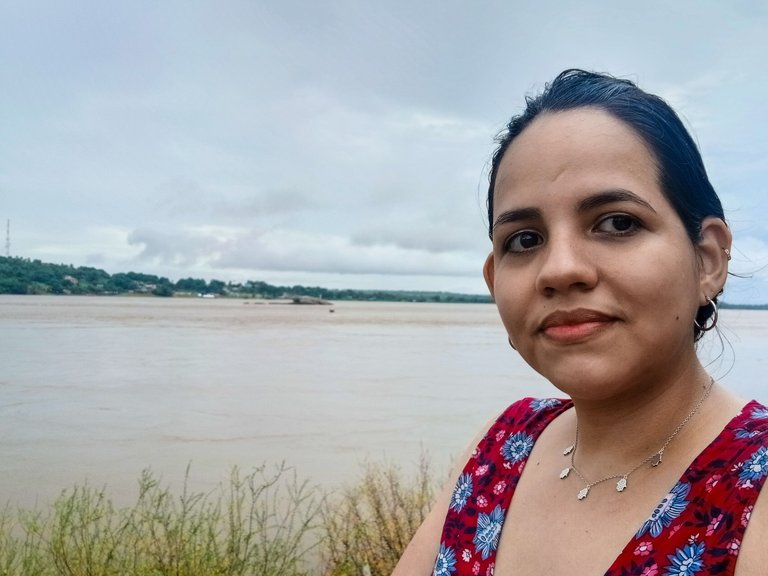
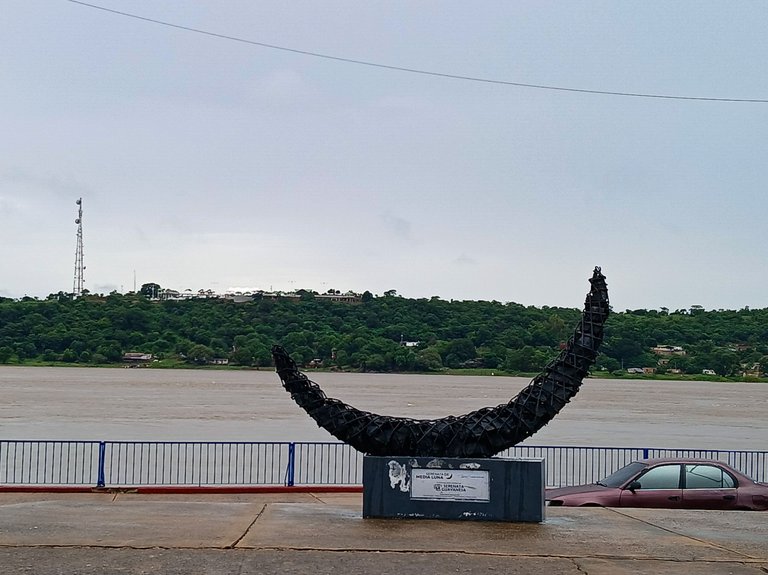
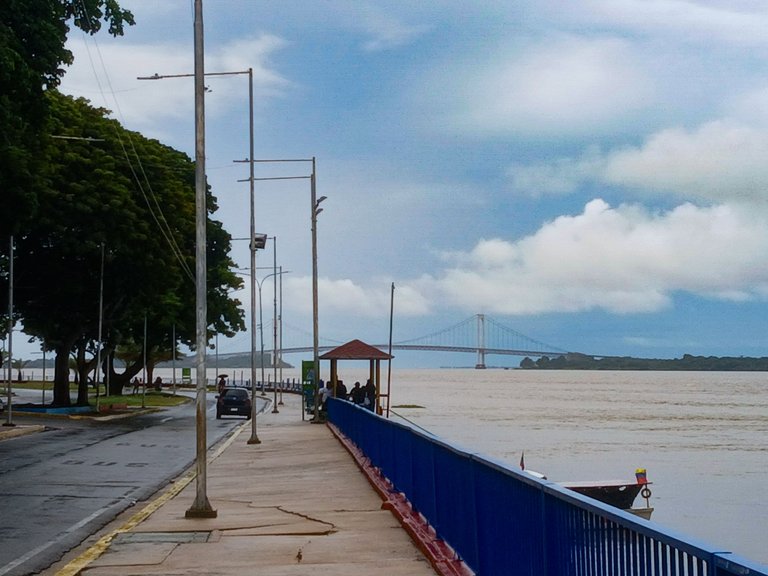
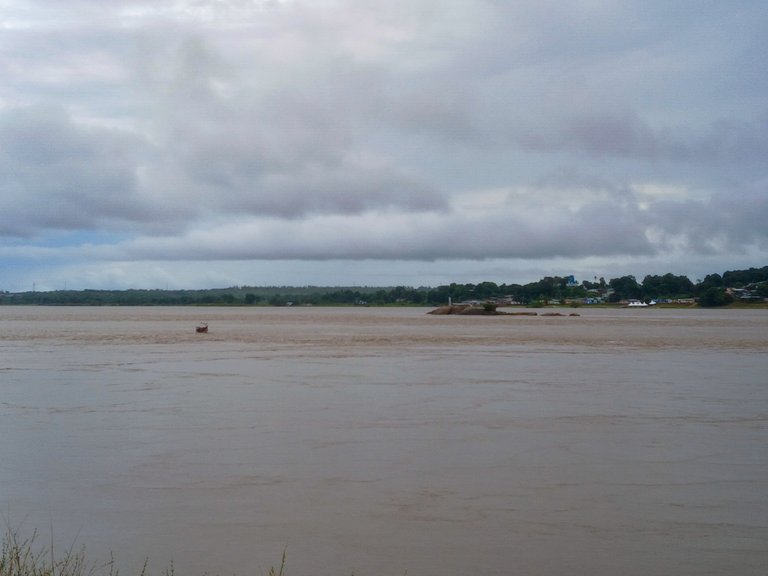
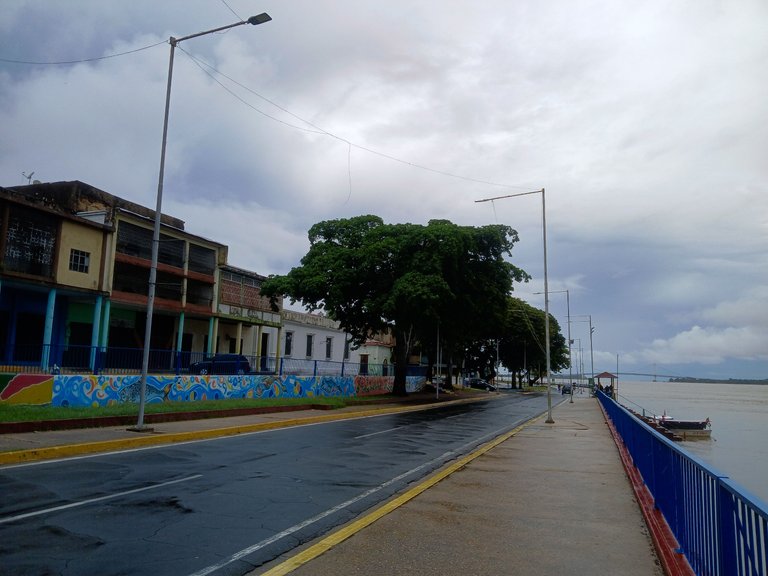
It may seem like an isolated topic, but the main attraction of the boardwalk is the majestic Orinoco River, its "Middle Stone," which separates Ciudad Bolívar from Soledad, and the legend behind this rock. According to indigenous legend, beneath this large rock lies a seven-headed serpent, which, when threatened, is capable of killing fish, fishermen, or anyone who passes by. There is also evidence of a barge called "La Mucura," which sank in 1952 and was supposedly loaded with gold, so divers were sent to find the cargo. The truth is that one of those divers claims to have encountered a "monster," further perpetuating the story of the serpent. Although it is only a legend, the truth is that the locals respect the great rock and avoid passing by or challenging the spirit. Some even make offerings to keep it calm and the waters calm.
Among other things, in the distance and to the left, you can see the great Angostura Bridge. It offers picture-postcard images. It is even more beautiful at sunset. Visiting Ciudad Bolívar turned out to be pleasant, one of those trips you won't forget, and for a moment I was also reminded of Jules Verner with his novel "The Proud Orinoco." I'll leave you with some pictures of the place and hope you enjoyed this tour and the stories behind this great river. See you next time. Thanks for stopping by.
Quizá parezca un tema aislado pero si el malecón tiene un atractivo es gracias al majestuoso río Orinoco, su "Piedra del Medio" que separa Ciudad Bolívar con Soledad y la leyenda detrás de esta roca. Según la leyenda indígena, debajo de esta gran roca se encuentra una serpiente de siete cabezas la cual, cuando se siente amenazada, es capaz de acabar con la vida de peces, pescadores o cualquiera que pase por allí. También se sabe de una chalana llamada “La Mucura", la cual se hundió en el 52 y supuestamente iba cargada de oro, por lo que se enviaron buzos para dar con el cargamento. Lo cierto es que uno de esos buzos dice haberse encontrado con un "mounstro", por lo que a través de ese hecho se perpetuo aún más la historia de la serpiente. Aunque es solo una leyenda, lo cierto es que los pobladores guardan respeto a la gran roca y evitan pasar por sus alrededores o desafiar al espíritu. Hay incluso quienes dan ofrendas para que este se mantenga tranquilo y las aguas se mantengan serenas.
Dentro de otras cosas, a lo lejos y a la izquierda, se puede ver el gran Puente de Angostura. Ofreciendo imágenes de postal. Es aún más bello durante el atardecer. Visitar Ciudad Bolivar resultó ser agradable, siendo de esos viajes que uno no olvida y por un momento recordé también a Julio Verner con su novela "El Soberbio Orinoco". Los dejo con las imágenes del lugar y espero que hayan disfrutado de este recorrido y las historias detrás de este gran río. Nos vemos en una próxima oportunidad. Gracias por pasar por aquí.
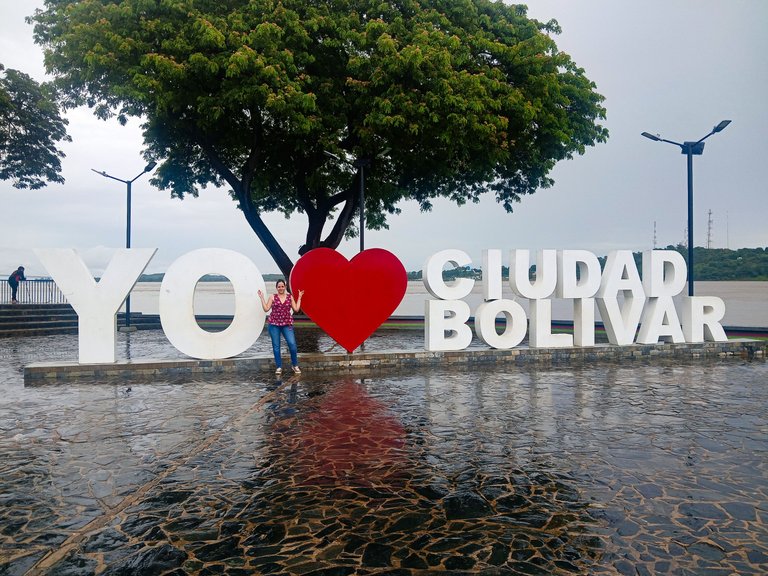
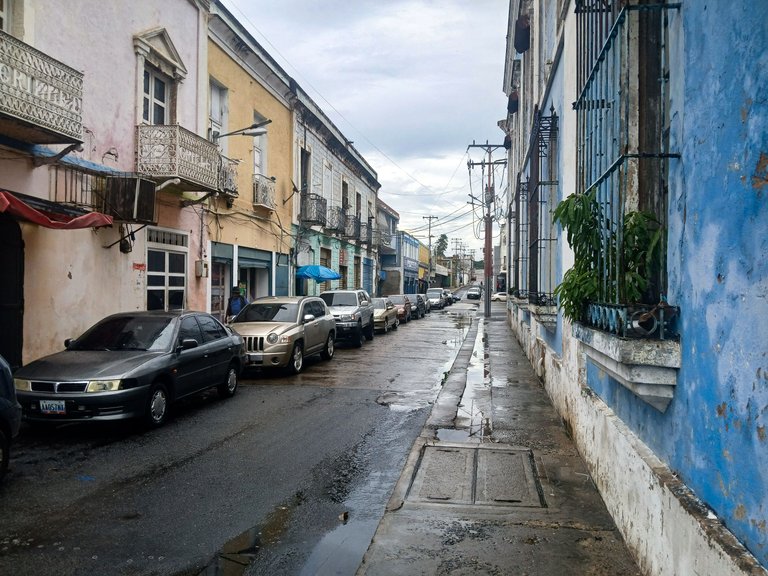
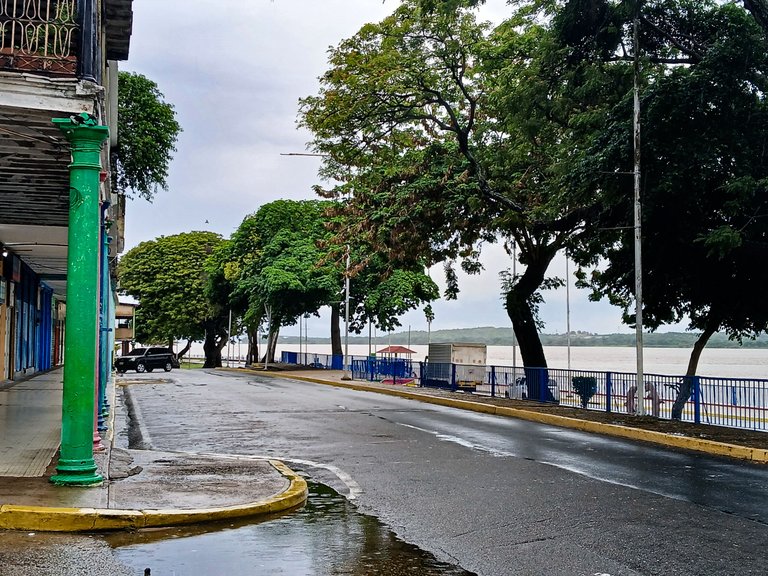
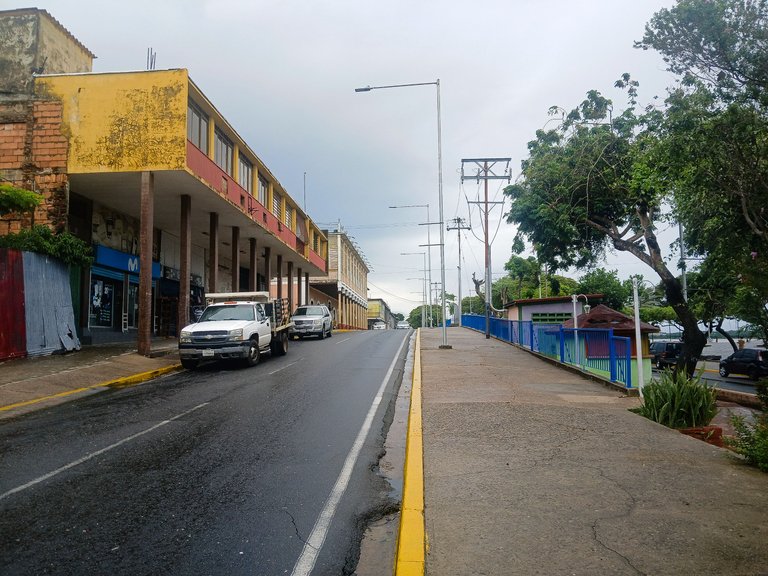
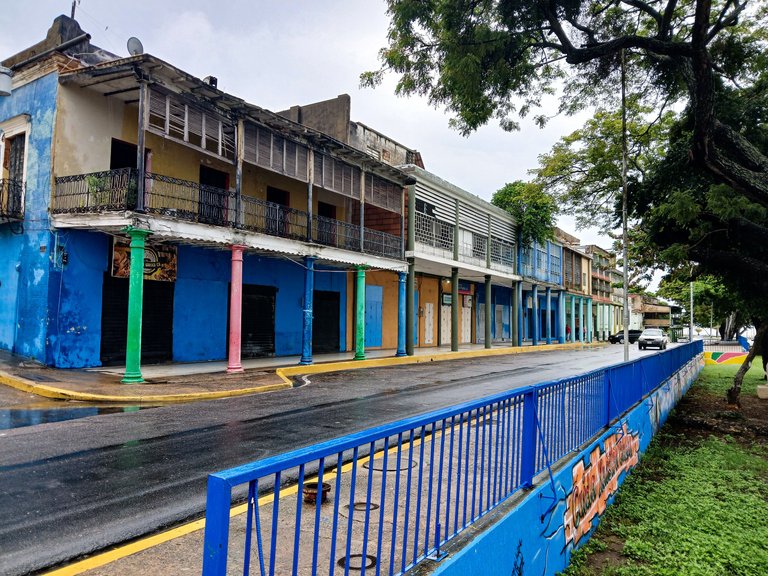

0
0
0.000
You can check out this post and your own profile on the map. Be part of the Worldmappin Community and join our Discord Channel to get in touch with other travelers, ask questions or just be updated on our latest features.
I really enjoyed reading your blog. Your photography styles were great. Best wishes to you.
I love the photos! And this place is calm and tranquil. I love reading your article.
Hiya, @lauramica here, just swinging by to let you know that this post made it into our Honorable Mentions in Travel Digest #2612.
Your post has been manually curated by the @worldmappin team. If you like what we're doing, please drop by to check out all the rest of today's great posts and consider supporting other authors like yourself and us so we can keep the project going!
Become part of our travel community:
The location is really beautiful
La gran y hermosa Ciudad Bolivar, debe ser maravilloso poder ir, gracias por contar parte de las historias y del arte del Orinoco, que bello. Espero poder algún día ir!, saludos bella y de verdad muy linda tu publicación, me encanto
Hello carminasalazarte!
It's nice to let you know that your article won 🥇 place.
Your post is among the best articles voted 7 days ago by the @hive-lu | King Lucoin Curator by keithtaylor
You and your curator receive 0.0000 Lu (Lucoin) investment token and a 10.89% share of the reward from Daily Report 716. Additionally, you can also receive a unique LUGOLD token for taking 1st place. All you need to do is reblog this report of the day with your winnings.
Buy Lu on the Hive-Engine exchange | World of Lu created by @szejq
STOPor to resume write a wordSTART